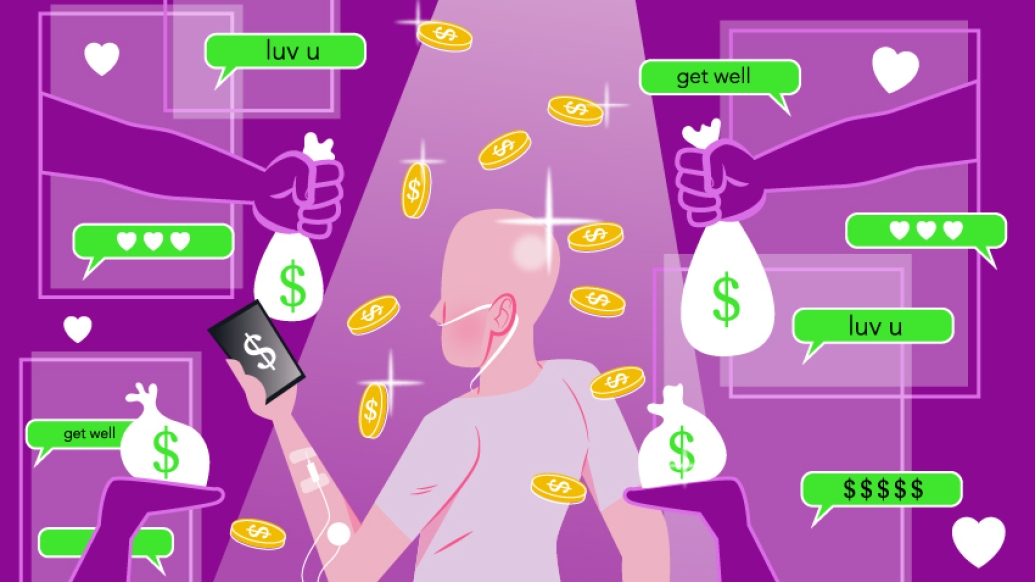A survey of young adult cancer survivors illustrates the compromises people make when asking family, friends for financial support during cancer treatment.
5:00 AM
Author |

Crowdfunding has become a means for people with cancer to get help managing the financial impact of their disease. But while there's relief in paying bills, a new study finds that it comes at a cost: a sense of shame and stigma from asking for help and revealing personal health details.
The issue is particularly critical for young adults with cancer, a specific group that is understudied and yet faces distinct needs.
MORE FROM THE LAB: Subscribe to our weekly newsletter
"Young adults are at that point in life where they are beginning to achieve financial independence and finding career employment. When a cancer diagnosis hits, it can really impact that young person's financial wellbeing," said Lauren V. Ghazal, Ph.D., M.S., a postdoctoral nursing student at the University of Michigan Rogel Cancer Center and a research fellow at the School of Nursing.
To understand the role of crowdfunding, researchers surveyed 46 young adult cancer survivors who had sought financial help from friends and family. The survey asked survivors to describe both their experience with and their thoughts about crowdfunding. Results are published in the Journal of Cancer Survivorship.
Crowdfunding involves raising money from friends and family. The most commonly known platform is GoFundMe, which says it hosts more than 250,000 medical fundraisers per year, raising more than $650 million per year. People also use social media to ask for help, or may hold raffles, church dinners or other events in their community.
In the study, the average crowdfunding campaign raised just under $3,500, with about half reporting they did not meet their goal.
Participants described relief at raising money to help defray their medical expenses or living expenses while undergoing treatment. They called it "a lifesaver" and noted that they might not have been able to afford treatment or other daily living necessities without it.
But survivors also expressed unease, considering crowdfunding to be humiliating and questioning why it's necessary.
SEE ALSO: Meet the team that's changing cancer experiences for teenagers, young adults
The authors describe it as the "Crowdfunding Compromise": tensions between the vulnerable feelings of disclosing a personal situation, the stigma of asking for help and the relief of receiving much-needed funds.
"Asking for help is difficult. It's even harder for a young adult who just got diagnosed with a serious illness. This is not something a young adult cancer patient does lightly. And it's not something that necessarily should be expected – that they immediately have to disclose their whole history on a social media site to pay their bills," said Ghazal, the paper's first author.
Survivors noted feeling uncomfortable with the idea of crowdfunding, struggling with how much detail to reveal while still positioning their situation as worthy of others' support.
Expenses can stem from cancer treatment, including high insurance deductibles, or they can be a result of not being able to work during treatment. In addition, financial burden can last well beyond the end of treatment, with ongoing prescriptions and scans, mounting bills and loans, and potential challenges regaining a footing in the workplace.
The study also suggests that crowdfunding could be increasing racial and economic disparities, with people from wealthier socioeconomic backgrounds more likely to raise more money and more likely to meet their goal.
The researchers focused specifically on young adult cancer survivors, but Ghazal says crowdfunding concerns could easily extend to people with cancer in other age groups or to people with other serious medical conditions.
"Crowdfunding serves a purpose in addressing young cancer survivors' immediate needs," Ghazal said. But the authors call crowdfunding "the epitome of treating symptoms without attention to their root causes."
"Crowdfunding is an individual solution," Ghazal said. "We need to look at broader interventions to reduce financial toxicity and increase social support for young adult cancer survivors."
Additional authors on the paper are Samantha E. Watson, Brooke Gentry and Sheila J. Santacroce. Funding was from National Cancer Institute grant T32-CA236621.
Paper cited: "'Both a life saver and totally shameful:' Young adult cancer survivors' perceptions of medical crowdfunding," Journal of Cancer Survivorship. DOI: 10.1007/s11764-022-01188-x
Like Podcasts? Add the Michigan Medicine News Break on iTunes or anywhere you listen to podcasts.

Explore a variety of healthcare news & stories by visiting the Health Lab home page for more articles.

Department of Communication at Michigan Medicine
Want top health & research news weekly? Sign up for Health Lab’s newsletters today!





